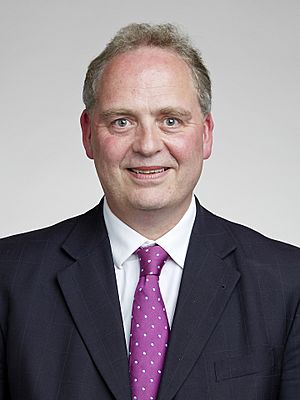Antony Galione facts for kids
Quick facts for kids
Antony Galione
FRS FMedSci
|
|
|---|---|

Galione in 2016
|
|
| Born | 13 September 1963 Chelmsford, England
|
| Education | Felsted School |
| Alma mater | Trinity College, Cambridge |
| Spouse(s) |
Angela Clayton
(m. 1992) |
| Awards | Novartis Prize (2001) |
| Scientific career | |
| Fields |
|
| Institutions | |
| Thesis | Oscillations in intracellular calcium in the blowfly salivary gland (1989) |
| Doctoral advisor | Michael Berridge |
Antony Giuseppe Galione (born 13 September 1963) is a British scientist who studies how our bodies work at a tiny level. He is a professor and a senior researcher at the University of Oxford. His main area of study is called pharmacology, which is about how medicines affect living things.
Contents
About Antony Galione
Antony Giuseppe Galione was born on 13 September 1963 in Chelmsford, England. He went to Felsted School in Essex for his early education. Later, he studied at Trinity College, Cambridge. In 1985, he earned a Bachelor of Arts degree in Natural Sciences, focusing on pharmacology.
He continued his studies and received his PhD in 1989. For his PhD, he researched how calcium signals work inside the salivary gland of a blowfly. His supervisor for this important work was Michael Berridge.
Understanding Cell Signals
Professor Galione's research focuses on something called calcium signalling. Think of calcium signalling as a secret message system inside our cells. Cells use tiny amounts of calcium to send signals and control many important jobs. These signals help cells know when to do things like grow, move, or even fight off germs.
Scientists like HC Lee first thought about how different messengers could tell cells to release calcium from inside. Other researchers, like Zhu and Evans, found the specific "doors" or channels (called two-pore channels or TPCs) that let calcium out from special storage areas inside cells, called organelles. This research helps us understand how calcium acts like a master controller for many cell processes.
Professor Galione discovered that certain molecules, like cyclic ADP-ribose and Nicotinic acid adenine dinucleotide phosphate (NAADP), are very important for these calcium signals. He showed that NAADP helps start and coordinate calcium signals, often by connecting different parts of the cell.
How Calcium Signals Affect Health
By using new ways to study cells, Professor Galione has shown that these calcium messengers and their targets control many basic processes in our bodies. These processes include things like:
- How the Ebola virus infects cells.
- How fertilisation and the early development of an embryo happen.
- How our heart muscles contract and pump blood.
- How our immune system's T cells get activated to fight infections.
- How nerve cells in our brain send electrical signals.
He also found that lysosomes, which are like the recycling centers of cells, can store calcium. When NAADP tells them to, they release this calcium. This discovery showed a completely new role for lysosomes in both healthy bodies and in diseases.
Professor Galione was the head of the Department of Pharmacology at the University of Oxford from 2006 to 2015.
Awards and Recognition
Professor Galione has received several important awards for his scientific work. In 2010, he was chosen as a Fellow of the Academy of Medical Sciences (FMedSci). This is a big honor that recognizes his excellent contributions to medical science. In 2016, he was also elected a Fellow of the Royal Society (FRS), which is one of the oldest and most respected scientific honors in the world.
He also received the Novartis Prize from the British Pharmacological Society in 2001.
 | Jackie Robinson |
 | Jack Johnson |
 | Althea Gibson |
 | Arthur Ashe |
 | Muhammad Ali |

